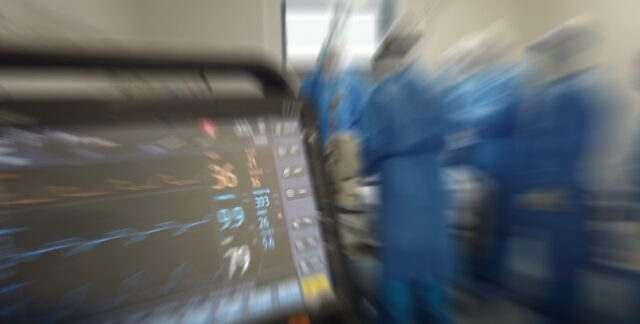
SynAct Pharma om Covid-19-satsningen
En allvarlig följd av infektion med COVID-19 är svår lunginflammation som kan leda till akut respiratoriskt stressyndrom (ARDS) och påföljande behov av respiratorbehandling. Tidigare i veckan kunde SynAct Pharma meddela att bolaget avser positionera sin kliniska antiinflammatoriska läkemedelskandidat AP1189 som tilläggsterapi hos inlagda patienter med COVID-19-infektion, för att förebygga ARDS. BioStock kontaktade bolagets vd Jeppe Øvlesen för en kommentar.
Stora forskningsinsatser görs världen över för att ta fram ett vaccin mot virussjukdomen COVID-19 (coronavirus disease 2019) som orsakas av viruset SARS-CoV-2 (severe acute respiratory syndrome coronavirus-2). Det är dock inte per definition viruset som dödar, utan dess systemiska konsekvenser på kroppens organ. En av de allvarligaste följdverkningarna av COVID-19 är svår lunginflammation, som i sin tur kan leda till akut respiratoriskt stressyndrom (ARDS). Tillståndet kräver ofta respiratorbehandling och utgör den vanligaste dödsorsaken i det pågående virusutbrottet.
ARDS kräver inflammationshämmande insatser
Utöver att ARDS ofta kräver andningshjälp med respirator, som blåser in extra syre i lungorna så att koldioxiden kan lämna kroppen, är sjukdomen associerad med hög risk att utveckla systemiskt inflammationsbesvärssyndrom (SIDS). Detta tillstånd är i sin tur förknippat med en hög dödlighet orsakat av ett överaktiverat immunsystem (en s.k. cytokinstorm).
Ett sätt att hämma inflammationen i lungorna är att sätta in anti-inflammatorisk behandling. Detta är dock en komplicerad klinisk avvägning då denna behandling kan försvaga immunförsvaret, vilket i sin tur kan försvåra för patienten att överleva.
![]() Det är här det danska bioteknikbolaget SynAct Pharma har identifierat en möjlig utökad positionering av sin läkemedelskandidat AP1189 – bolagets ledande kandidat och en ”First-in-Class” biased melanokortinreceptoragonist riktad mot aktiva inflammatoriska och autoimmuna sjukdomar. First-In-Class-benämningen syftar på ett läkemedel som använder en ny och unik verkningsmekanism för att behandla ett medicinskt tillstånd.
Det är här det danska bioteknikbolaget SynAct Pharma har identifierat en möjlig utökad positionering av sin läkemedelskandidat AP1189 – bolagets ledande kandidat och en ”First-in-Class” biased melanokortinreceptoragonist riktad mot aktiva inflammatoriska och autoimmuna sjukdomar. First-In-Class-benämningen syftar på ett läkemedel som använder en ny och unik verkningsmekanism för att behandla ett medicinskt tillstånd.
Forskningsplattformen bygger på ett kroppseget hormon
SynAct Pharmas forskning och patent bygger på det kroppsegna hormonet melanocortin. Detta hormone aktiveras vid inflammatoriska tillstånd och bidrar med anti-inflammatoriska effekter som är avgörande för läkningsprocessen och återhämtning till normal vävnadsfunktion. Mer konkret aktiverar detta hormon specifika melanokortinreceptorer på cellytan av en sorts vita blodkroppar och sätter därigenom igång processer för bromsad inflammation och stimulering av läkningsprocesser i vävnad.
Immunförsvaret förblir intakt
SynActs Pharmas mål är bli en ledande aktör inom resolutionsterapi vid inflammatoriska och autoimmuna sjukdomar. Behandlingskoncept bygger på att förstärka immunsystemets läkningsmekanismer genom att aktivera kroppens egna immunceller. Detta skiljer sig från biologiska och immunosuppressiva läkemedel som istället verkar genom att hämma immunsystemet.
Därmed medför inte SynAct Pharmas behandlingskoncept samma risk för de negativa immunologiska biverkningar som är förknippade med dagens terapier. Det innebär också att patienternas immunförsvar behåller förmågan att skydda mot t.ex. infektionssjukdomar och cancerutveckling.
Tänkt behandling av COVID-19
Den 31 mars stod det alltså klart att SynAct Pharma har för avsikt att utöka indikationen för sin läkemedelskandidat AP1189 och studera om denna kan ha gynnsam effekt vid behandlingen av patienter med COVID-19. Bolagets hypotes är att en behandlingseffekt ska uppnås genom att dämpa den inflammatoriska respons utan att det leder till immunsuppression och en förvärrad inflammatorisk status hos dessa patienter, samtidigt som en tillräcklig andningsfunktion kan säkerställas.
Gynnsamma marknadsutsikter även bortom COVID-19
Även om Covid-19 har skapat ett nytt indikationsutrymme för AP1189, skall man inte glömma bort att ARDS utgjorde en stor utmaning för sjukvården redan innan den pågående pandemin.
Mekanisk ventilation utgör alltjämt det viktigaste terapeutiska ingreppet i ARDS. Faktum är att det är det enda tillvägagångssättet som har visats minska det inflammatoriska svaret och dödligheten I sjukdomen. De senaste 25 år har inga större framsteg uppnåtts inom detta område, och därför är dödligheten hög: 27 procent, 32 procent och 45 procent för mild, måttlig respective svår sjukdom.
Uppskattningen av förekomsten av ARDS i t.ex USA pekar på 64,2 till 78,9 fall per 100 000 individer. 25 procent av ARDS-fallen klassificeras initialt som milda och 75 procent som måttliga eller allvarliga. Men en tredjedel av de milda fallen blir utvecklas I själva verket till måttlig eller svår sjukdom.
Så trots att vår förståelse av orsakerna och patofysiologin bakom ARDS har ökat, råder det fortfarande stora kunskapsluckor vad gäller epidemiologin, samtidigt som dödligheten är oacceptabelt hög. Behovet av nya innovativa behandlingar är således stort.
Den globala ARDS-marknaden värderades till MUSD 583,8 under 2018 och förväntas nå ett värde om MUSD 934,8 år 2026. Även om man inte räknar in den potentiella COVID-19-marknaden så kan AP1189 med andra ord positioneras inom ett betydande marknadsutrymme där det saknas marknadsgodkända substanser, samtdigt som patientgruppen är underbehandlad.
Finansering av kliniska studier
I pressmeddelandet från den 31 mars kan man läsa att SynAct Pharma bedömer att kostnaden för en klinisk studie med AP1189 på COVID-19-patienter inte kommer överstiga 15-20 Mkr.
Bolaget förväntar sig att dagens likvida medel och ett tillskott om maximalt 32,8 Mkr från inlösen av teckningsrätter av serien T0 2 under juli 2020, kommer att finansiera bolaget till viktiga milstolpar inom övriga projekt. Detta inkluderar kostnadstäckning för fas II-studien med AP1189 inom reumatoid artrit (RA) samt till dess att man når Proof-of-Concept med AP1189 inom nefrotiskt syndrom.
Vd kommenterar
BioStock vände sig till SynActs Pharmas vd Jeppe Øvlesen för en kommentar kring beskedet om det utvidgade indikationsutrymmet för AP1189.

Jeppe Øvlesen, earlier this week SynAct decided to investigate the potential for the development of AP1189 as additional therapy in hospitalised patients with COVID-19 infection. At what stage of the disease do you think the substance can be of most use to the patient?
– The compound should be given to patients with signs of reduced oxygenation. Either from admission to test whether the compound could protect against the need for non-invasive as well as invasive ventilator treatment. Alternatively, it could be used in patients in need of non-invasive ventilator treatment, i.e. CPAP, to test whether the treatment could avoid or reduce the need for invasive ventilator treatment. This is what we currently discuss with the clinicians.
Currently the primary indications for AP1189 are active RA and Nephrotic Syndrome, but you also believe that your candidate could be of clinical use in Covid-19 patients. How so?
– Because severe Covid-19 infection in many perspectives has similarities with active autoimmune disease as RA and also to some degree NS. The key problem in the RA patients we currently include in our clinical phase II study is overactivation of the immune system in the joints. The joints are swollen, tender and painful because of active uncontrolled inflammation. Likewise, in severe Covid-19 infection the inflammatory response in the lungs is out of control. So, the purpose of our treatment would, just as in RA, be to get the inflammation balanced so that inflammatory system still can fight the virus infection, without all the devastating effects associated with an overactivation.
Can you tell us more about the candidate’s dual mechanisms-of-action?
– When we describe that compound as having a dual mechanism of action it refers to the compound’s ability to
- Reduce, but not block, proinflammatory pathways like the activation of neutrophils and release of pro-inflammatory cytokines like IL-1β, IL-6 and TNF-α.
- To stimulate resolution of inflammation, i.e. boost endogenous pathways that is aimed to clear up inflammations and thereby avoid avid inflammation and subsidiary development into chronic inflammation. A key pathway is to induce the macrophages’ ability to clear neutrophils, a mechanism called efferocytosis.
How soon will you be able to begin studies in Covid-19 and what regulatory processes do you need to go through before this is possible?
– The first thing would be to setup collaborations with the right clinical sites, then make the right study design. Many sites have initiated or are about to initiate studies on already approved compounds like Chloroquine, IL-6 blockers, immunoglobulins and JAK inhibitors, and we have to have his in mind when we come with a new treatment approach currently in Phase II development. However, we firmly believe that we have something to offer.
Next would then be to file for the clinical trial application and in parallel secure all the logistics and secure finances to run the study. This is not trivial, but pending financing and authority approval, we would be able to have the compound in patients in less than three months.
AP1189 leads to faster healing of the infection. Can you explain how this process works and why this is of specific interest in the treatment of ARDS in Covid-19?
– Because the AP1189 compound would be able to balance the immune response by combining the inhibition of some unwanted pathways and the stimulation of other beneficial pathways, together with what we call induced resolution. And from what we know about Covid-19 infections, that combination is exactly what is needed to avoid the development of the devastating symptoms that too often kill the patients.
»With our drug candidate AP1189, we have good reasons to believe it could make a difference for these patients. Furthermore, we know that it is safe and have the drug available so that we will be able to start a study very soon« — Jeppe Øvlesen, CEO SynAct Pharma
The decision to expand the indication of AP1189 is based on the fact that IL-6-inhibitors have been reported as potential treatment alternatives to reduce ARDS in patients with serious Covid-19-inflammation. What AP1189-related data do you have that support the assumption that the candidate has potential to also be effective against Covid-19?
– We have data in animal models associated with development of Systemic Inflammatory Distress Syndrome, where the compound inhibits the proinflammatory pathways including secretion of IL-6 and, in parallel, stimulates resolution, not least by stimulating the macrophages’ ability to clear the inflammation.
There is consensus in the research community that we will see new viruses in the future, possibly mutated versions of SARS-CoV-2. Do you see more potential uses for AP1189 in addition to those currently included in your pipeline?
– From the mode of action of the compound it would be likely to conclude that it would work in other infections associated with overactivation of the immune system. Every winter many patients suffer from complications related to the influenza virus infection, and many of these cases are fatal. Consequently, it would be logic to consider to test the AP1189 compound in patients infected with other virus other than SARS-CoV-2, including mutated versions of this virus.
You have stated that the financing of the potential clinical activities will be carried out separately, and thus will not affect SynAct’s ongoing activities within the company’s existing projects. Can you develop this reasoning, and tell us what is needed in order to be able to start a study in Covid-19 patients?
– With the present coronavirus pandemic, there is obviously a lot of attention from governments, hospitals and various funds to find solutions that can avoid or help the many affected patients. With our drug candidate AP1189, we have good reasons to believe it could make a difference for these patients. Furthermore, we know that it is safe and have the drug available so that we will be able to start a study very soon.
Your business strategy is to conduct phase II clinical studies and then sign commercial agreements with one or more major pharmaceutical companies. What is the general interest in your research platform like among these companies?
– In our interactions with pharmaceutical companies we have been met with great interest in our resolution therapy approach, i.e., the fact that our melanocortin-based drug candidate is able to create a balanced immune response through the combination of inhibition of some unwanted pathways and the stimulation of other beneficial pathways. Furthermore, we will soon have a pipeline with three clinical trials in some very interesting indications (RA, NS and Covid-19) with substantial medical needs for new and better solutions.
Finally, which milestones can we look forward to from Synact Pharma during the next 12 -18 months?
– If everything develops in accordance to our plans we will reach proof-of-concepts from phase II studies in RA, NS and Covid-19.
Innehållet i Biostocks nyheter och analyser är oberoende men Biostocks verksamhet är i viss mån finansierad av bolag i branschen. Detta inlägg avser ett bolag som BioStock erhållit finansiering från.


